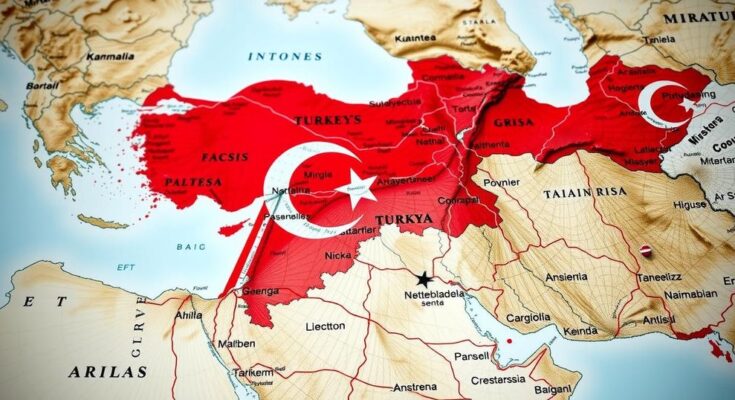The Middle East power dynamics are shifting with Turkey’s rise as a key regional player following the fall of the Assad regime in Syria. President Erdoğan’s support for Syrian rebels has bolstered Turkey’s influence from Iraq to Africa, challenging Iran’s traditional dominance. Turkey’s broadening ambitions and strategic interventions signify a groundbreaking change in how power is distributed regionally, poised against the backdrop of decreased Iranian control and traditional Sunni power, notably that of Saudi Arabia.
The geopolitical landscape in the Middle East is undergoing a significant transformation as marked by the fall of the Assad regime in Syria, signaling the decline of Iran’s feared ‘Shia crescent’ and the concurrent rise of Turkey’s ‘full moon.’ Under the leadership of President Recep Tayyip Erdoğan, Turkey has emerged as a key regional force, leveraging its support for Syrian rebels to exert influence across the region, encroaching upon the territories previously dominated by Iran.
Turkey’s direct involvement in the Syrian conflict has been pivotal in the rebels’ unexpected success. Unlike previous military campaigns in Syria characterized by destruction, Turkey’s contributions have focused more on intelligence and political support, leading to a more restrained offensive. Over the years, with Iran’s resources depleted due to Israeli strikes against its proxies and Russia distracted by its engagement in Ukraine, the downfall of the Assad regime became not just feasible but essential.
The ramifications of Turkey’s ascendance are expected to extend into Iraq, where it has persistently engaged with Kurdish forces and penalized the Kurdistan Workers’ Party (PKK). The establishment of a Sunni-led administration in Syria could bolster Turkey’s influence in Sunni-dominated areas of Iraq, challenging the Iranian-backed Shia militias that have gained prominence since the defeat of the Islamic State.
Furthermore, Turkey’s ambitions are broad, extending beyond Syria and Iraq to encompass regions across Africa, the Caucasus, and Central Asia. Following the Syrian rebels’ victory, Erdoğan brokered a peace initiative between Somalia and Ethiopia, while also asserting military influence in Libya. In Afghanistan, Turkey’s established rapport with the Taliban further consolidates its strategic posture near Iran’s borders.
As Turkey gains regional ground, the power dynamics shift, particularly for Saudi Arabia and its allies. Unlike Iran’s overt sectarian division, Turkey’s Sunni affiliation poses a more nuanced and expansive challenge, courting a broad spectrum of Sunni constituents and political Islamists. This creates tension with Riyadh, which has historically claimed leadership over the Sunni Muslim community.
The tendency for Iran’s power projection through proxies now faces stiff competition from Turkey’s direct engagement with local forces, severely undermining Saudi Arabia’s narrative as the preeminent Sunni authority. The fracturing of Iran’s influence, evidenced by its weakened footholds in Syria and Lebanon, allows Turkey to redefine alliances, transitioning Syria from an Iranian ally to a Turkish one.
Turkey’s ascendancy is driven not only by Iran’s falter but also by a proactive foreign policy that balances security and economic interests against its Kurdish threats. Turkey intertwines military action with diplomatic maneuvering, diverging from Iran’s sectarian approach, thus enabling it to establish operational efficacy across diverse ideological frameworks.
The developments in Turkey raise alarm among regional players such as Saudi Arabia, the UAE, and Israel, whose aspirations may now encounter a formidable Turkish entity. For Western powers, opinions on Turkey’s growing prominence are mixed, ranging from trepidation regarding its Islamist connections to acknowledgment of its critical role in Middle Eastern affairs. This shifting paradigm illustrates Turkey’s potential to redefine power dynamics in the coming years, prompting a reassessment of regional strategies in response to its burgeoning influence.
The article discusses the changing power dynamics in the Middle East, specifically focusing on the rise of Turkey under President Erdoğan as a dominant regional influence in contrast to Iran’s declining grip due to the fall of the Assad regime in Syria. The discussion highlights Turkey’s support for Syrian rebels, its strategic interests extending into Iraq, and its growing influence in various geopolitical arenas, which complicates the landscape for traditional powers such as Saudi Arabia.
In conclusion, the Middle Eastern geopolitical landscape is significantly evolving, with Turkey’s rise presenting both opportunities and challenges for regional powers. As Turkey asserts its influence across various territories, the strategic implications for Iran, Saudi Arabia, and other players will necessitate a reevaluation of their approaches. The future will likely witness intensified competition, with Turkey becoming an increasingly central figure in shaping regional politics and alliances.
Original Source: www.theguardian.com




